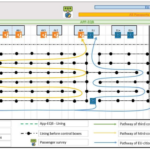A new information system is supposed to screen travellers for risks at the EU’s external borders. Of interest is, among other things, whether there is an irregular migration history or an “epidemic risk”. The agencies Europol and Frontex will receive new tasks for this.
After some delay, the new European Travel Information and Authorisation System (ETIAS) will go live at the end of next year. All visa free travellers entering the Schengen area for a short stay will have to register online via a form a few days before crossing the border. The information is checked automatically, after which the system issues either clearance or a contestable refusal of entry. The procedure costs 7 euros, a travel authorisation is valid for three years.
Carriers who operate journeys across an external EU border face new obligations and costs with the ETIAS Regulation. This concerns providers of air, sea, train or bus travel. Before boarding, they must check whether their passengers have a valid travel authorisation. For this, the companies will be given permission to check the passengers’ papers in ETIAS when they make a booking. Yesterday, the European Union asked companies to register for this process. The first tests of the system are to begin in February 2022.
Travellers must answer questions online

With ETIAS, the EU wants to determine in advance whether third-country nationals entering the EU pose a security risk. This applies, for example, to the areas of crime and terrorism. It also checks whether the persons have an undesirable migration history or pose an “epidemic risk”. All travellers must provide personal data as well as information on travel documents, accessibility and planned place of residence. In addition, questions are asked about previous journeys to war zones or convictions.
The information is checked against various police and migration-related databases. According to the current status, these are the Schengen Information System (SIS), the fingerprint system EURODAC, the Visa Information System (VIS), files at Europol and Interpol as well as the register for third-country nationals convicted of terrorism (ECRIS-TCN). The introduction of ETIAS required amendments to the regulations and implementing acts of all databases linked to the system.
Some EU agencies are also being given new tasks with ETIAS. As is now common for the big databases, the new system will also be developed, operated and technically supported by the Agency for the Operational Management of Large-Scale IT Systems (eu-LISA). For this, the agency received start-up funding of about 100 million euros, followed by another 212 million last year. According to the EU Commission, the annual operating costs amount to around 85 million euros.
Frontex develops “risk indicators”
Frontex is responsible for setting up an “ETIAS Central Unit”. Applications for travel permits are received there, and the border agency first subjects them to an identity check. Frontex is also supposed to sort out and delete “false hits”. This means, for example, different spellings of the same name.
The Central Unit networks all the competent authorities in the Schengen states as well as the participating transport companies. Queries are made via an interface and a secure communication infrastructure either via an intranet, by e-mail or a mobile app. The border agency has also been researching lie detectors for years, which analyse travellers during their online questioning. However, there are currently no plans to use the technology.
Frontex is also developing “risk indicators” for screening travellers in ETIAS. This includes constantly updated reports on countries where particular dangers are suspected.
“Watch list” at Europol
Under the new Europol Regulation, the police agency is also allowed to carry out searches in the ETIAS central system itself. Europol can also be consulted by individual member states after a person has been identified there as a supposed security risk.
Queries to Europol are made via the new QUEST interface, which was set up with the help of the German Federal Criminal Police Office (BKA). This includes the extensive analysis projects that Europol conducts on various crime areas. A response should be available within 60 hours. Because the volume of requests alone overwhelms Europol’s systems, Europol is conducting several trial runs this year with the support of the BKA.
Perhaps Europol’s most important function is the establishment and maintenance of an “ETIAS Watchlist”. It contains persons who have committed or are likely to commit terrorist offences or serious crimes. It is unclear according to which criteria the persons concerned are placed on the watch list. Corresponding information can come from the EU member states, the UN list of war criminals or from foreign secret services.
Image: Annie Spratt on Unsplash.





Leave a Reply